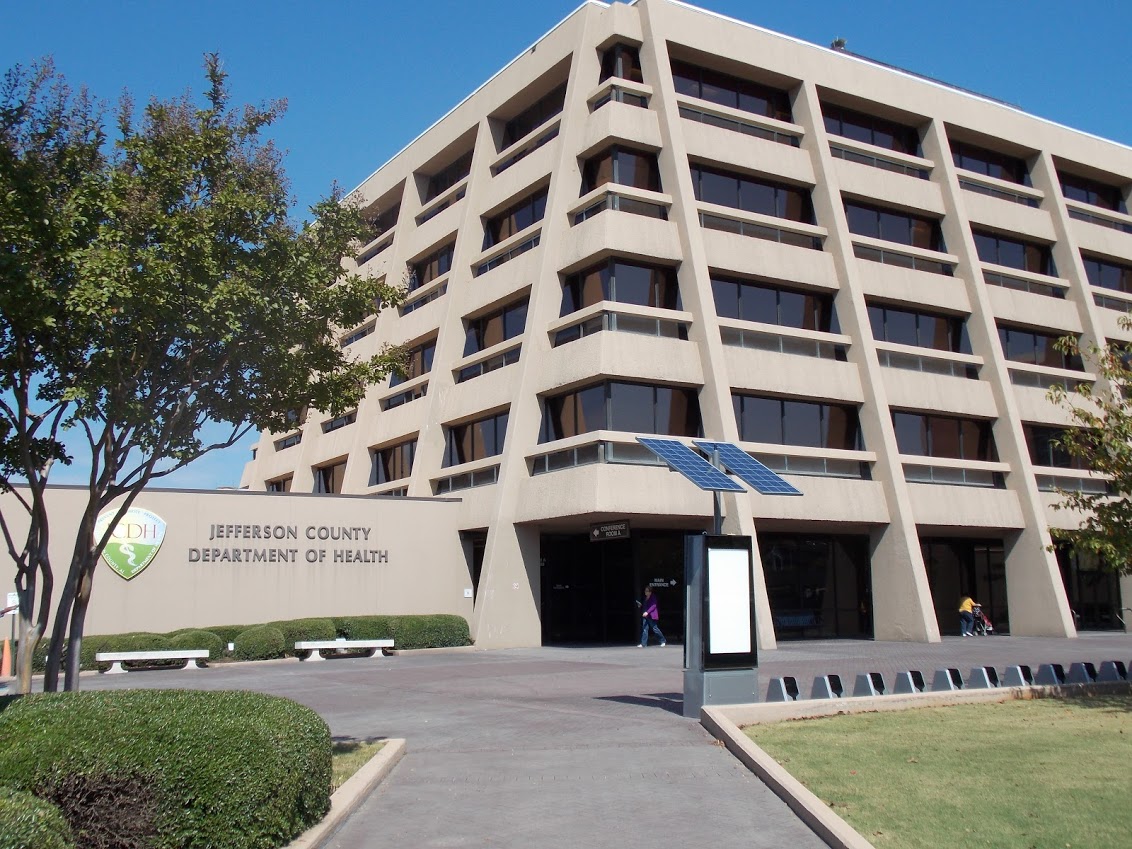By Anita Debro
For the Birmingham Times

When people see the Jefferson County Department of Health building on Sixth Avenue South, with its complex series of windows and angles, they likely think about a health clinic that serves the poor. Or maybe they think of the warehouse of public documents available there — birth, death and marriage certificates. While those two thoughts are correct, Dr. Mark E. Wilson said the county’s health department is so much more. “It is very broad, what we do,” said Wilson, the county’s health officer since 2011. “We are here to help protect the community against public health threats; prevent disease and promote healthy lifestyles.”
The Alabama Legislature back in 1875 established the first state department of health. But it wasn’t until 1917 that Jefferson County had part-time health officers that served the community in times of disease outbreaks and other health crises while also maintaining private practices. Now, the JCDH is celebrating its 100 year anniversary. And while officials at the health department are taking a look back at some of the county’s biggest health crises they are also looking forward with a new five-year strategic plan.
Wilson stressed that the JCDH is one of the few health departments in the country that has achieved accreditation from the Public Health Accreditation Board. He said the JCDH is making strides in the area of AIDS and HIV prevention and is looking to broaden initiatives that address hypertension and obesity.
Wilson recently sat down with The Birmingham Times to discuss the JCDH in detail. This article appears in an insert found in a recent special section on health and health disparities.
What all does the Jefferson County Department of Health handle?
Wilson: That’s actually hard to answer because there is a wide variety of things we do. Mainly we are here to protect the public’s health. We handle traditional inspections services to make sure food is safe in restaurants and pools are clean. We handle disease control monitoring; provide services to help treat those diseases and help prevent the spread of those diseases. We also have our clinics ( the Central Health Center on the southside, Eastern Health Center in Roebuck and the Western Health Center in Midfield) that help the low-income and uninsured. We do emergency preparedness classes and provide environmental help and services with issues such as septic tanks, rabies, inspection of daycare centers. The list goes on and on.
Tell me about the strategic plan.
 Wilson: The strategic plan was developed with a lot of input from the community. We were looking at the challenges and what are the emerging needs in order to establish new initiatives.
Wilson: The strategic plan was developed with a lot of input from the community. We were looking at the challenges and what are the emerging needs in order to establish new initiatives.
What are some of the new initiatives and programs that were developed from the plan?
Wilson: We face big challenges with sexually transmitted diseases in Jefferson County. We are not where we would like to be with syphilis and HIV in the area. We want to put more effort into further improving those statistics. We are introducing a new program for HIV prevention called PrEP, which will make available a pill that could greatly reduce the risk of HIV infection. We have a criteria to identify people at high risk of HIV infection. We have already started that program this year. We are getting those high-risk people who are willing to participate and that is really exciting. That could have big impact if we reach the right people.
We also have an initiative to address Hepatitis C. We have some of the Baby Boomer population with increased risk of getting Hep C and the younger population at risk from using needles. We will begin to screen more people for that and help link more people with help they need to get the medicine to treat and hopefully cure that. The medicine is extremely expensive and we are helping people get assistance from drug companies to help get medicine.
What other areas will you be focusing on for prevention?
Wilson: We plan on addressing birth outcomes in the county—our infant mortality rate is still unacceptably high and there is an unacceptable disparity with black and white babies. Black babies are almost 3 times likely to die the first year in life compared to white babies. So, we are rolling out initiatives to make sure [the] at risk get really good prenatal care and also care after the baby is born so the parents know how to take care of the baby and to make sure that the baby has the appropriate mental and emotional development.
Addressing the opioid crisis with heroin and fentanyl is also a big priority with us. We will have a resource center here in Jefferson County, a place where people with addiction problems or family members can go and get help finding available resources to address addiction. We are also trying to bring more mental health services to our patients.
The Jefferson County Department of Health has a long and storied past. And it has been able to make significant impact in county health. What are some of the JCHD’s greatest milestones?
Wilson: In terms of recent history it was the work we did with our partners, including the CDC, between 2010 and 2012 to pass a comprehensive smoke-free plan for the cities in Jefferson County. One of our biggest milestones was when the City of Birmingham passed smoke-free laws for public areas in the city. That was a big, big breakthrough. We were really proud of the city and city council to do that. We now have roughly half of the population in the county covered by smoke-free policies and we are looking for more cities to join in.
We were able to develop in 2012 regulations for daycare centers. Those regulations now require all daycare centers that had previously been exempted in the county to be inspected to ensure babies are safe and employees are trained properly and that there is appropriate staffing.
We have also had some recent success in helping developing the Red Rock Ridge and Valley Trail system. Through funding from the CDC for obesity prevention, we helped develop the trail master plan in 2012. We are currently in the process of helping to procure land for the 16 1/2 miles in the Five Mile Creek Corridor.
Anything else that you would like to highlight?
Wilson: Birmingham had an air pollution crisis of 1971 in which the particulate matter levels got so high in Birmingham that it was a public health emergency, and the health department, working with the EPA and a federal judge actually had to order local steel mills to shut down temporarily. This was the first such enforcement action in the United States since the passage of the federal Clean Air Act and the formation of the U.S. EPA. It was a public health emergency. JCDH now has an Air Division that monitors and regulates air pollution/polluters in Jefferson County. We are very proud with the progress we have made.
To read more about the Jefferson County Health Department, see the insert in The Birmingham Times.





